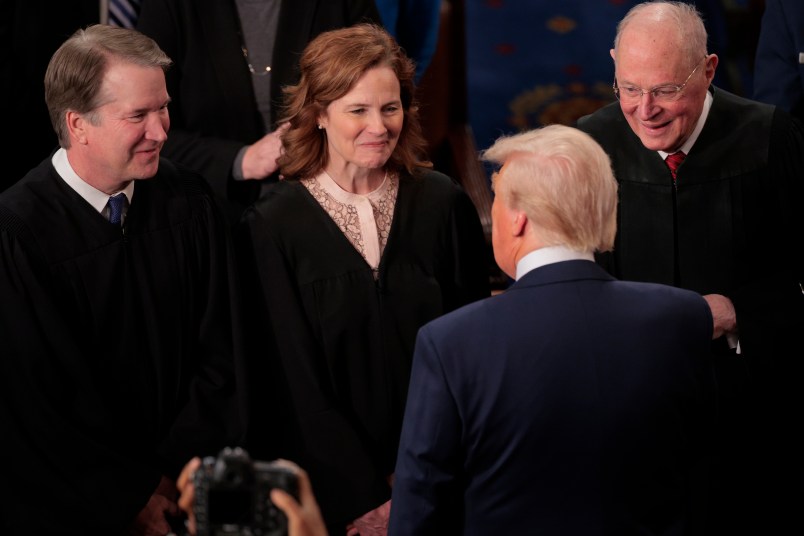The Trump administration must “facilitate” the release of Kilmer Abrego Garcia, the man who was wrongly deported last month to a labor camp in El Salvador, the Supreme Court ruled on Thursday.
But the Court held short of ruling on how far the judiciary can go in mandating what efforts the government must take to “effectuate” his release, and asked a lower court to clarify what it meant when it used that word in an order.
The Court found that the district court judge’s order demanding that the Trump administration return Abrego Garcia “properly requires the government to ‘facilitate’ Abrego Garcia’s release from custody in El Salvador and to ensure that this case is handled as it would have been had he not been improperly sent to El Salvador.”
The decision does clearly direct the Trump administration to move to return Abrego Garcia, who was deported on March 15 after the government mistakenly ignored an immigration court order barring his removal.
The Supreme Court lifted the original deadline and did not set a new one, nor did it offer the district court guidance on when, or if, a new deadline should be set.
Thursday’s order cuts against a series of truly extreme arguments by the Trump administration, which both admitted that it had wrongly removed Abrego Garcia but claimed that courts could not order it to correct the mistake.
ICE agents had arrested Abrego Garcia on March 12. Three days later, after what the administration described as a mix-up during an operation to remove more than 100 Venezuelans under the Alien Enemies Act absent a hearing, Abrego Garcia was on a plane to El Salvador.
He appears to have been deported along with several other El Salvador citizens that Secretary of State Marco Rubio accused of having ties to MS-13.
Abrego Garcia’s accidental removal — whoops — came as part of a concerted effort by the Trump administration to stage a large, immigration-related publicity stunt: it would rush a large number of Venezuelans, gang members or not, out of the country to El Salvador’s infamous labor camp. At the same time, a bevy of supposed MS-13 members would also be returned to their native El Salvador.
How Abrego Garcia wound up in the mix remains unclear. The Trump administration frustrated one district court’s attempts to determine what happened by invoking the state secrets privilege over basic questions about the operation; it’s only said that Abrego Garcia was wrongly removed because he was placed on an alternate manifest that failed to note the order barring his removal.
After attorneys sued on Abrego Garcia’s behalf, a district court judge in Maryland, the state in which he was detained, ordered the government to facilitate his return.
It took the Supreme Court more than three days to reach a decision stating that, in fact, the district court was largely correct: the government must facilitate his return. The decision had no noted dissents, including to its limitation: that the government must be ordered to try, but not necessarily to achieve, a certain result.
The Court did, for the first time in the El Salvador removal cases, obliquely address the Trump administration’s refusal to provide information to judges asking about what it is doing. The Court said that the government should “be prepared to share what it can” about the steps that it’s taking in response to the order.
In a fiery statement written by Justice Sonia Sotomayor, the three Democratic appointees said that they would not have intervened at all, preserving the district court order in its entirety.
The statement excoriated the Trump administration for making such an egregious error and for then refusing to try to correct it, but mostly spared the Court any criticism.
The government, Sotomayor wrote, “has cited no basis in law for Abrego Garcia’s warrantless arrest, his removal to El Salvador, or his confinement in an El Salvador prison. Nor could it.”
The Trump administration had, in these cases, doubled down with an argument that was incredible in its breadth: not only can courts not order the government to undo erroneous removals, it argued — it could also do the same to U.S. citizens, evading judicial scrutiny so long as it all took place before a lawsuit was filed.
“That view refutes itself,” Sotomayor wrote.
Read the decision below.







“Facilitate,” with no deadline? It may be an ideological win, but we’ll probably never see the poor man again. Without a deadline, it’ll be Schroedinger’s court order defiance.
When it’s about somebody’s life and liberty, the grade should not be based on effort.
Morally, there was no other answer, though I would not have been surprised if the Republican SC justices found one anyways. This resets things, the district judge will tell the government to get him back and put immense pressure on them to do so. There’s a very good chance the government ignores her, so we might be looking at contempt proceedings sooner or later. But, really, they just want to make it appear that this is permanent in order to scare immigrants into self-deporting, so they will fight as hard as they can not to concede.
The SC is drawing a line though, people can’t be deported without opportunity for judicial review and people wrongly deported are supposed to be brought back. It could be a lot worse…it may still turn out that way, one of these cases will eventually end up in arguments for a real decision, and which one they pick for it will give an indication of how far they are willing to go down a road that could potentially deport US citizens.
Anyone know how much AP had to grovel, pay, or do to get back their press access? Did the elite law firms get a better deal because they bent over earlier?
“Facilitate.” Words proven to scare the shit out of Trump and his “administration.”
Well done.